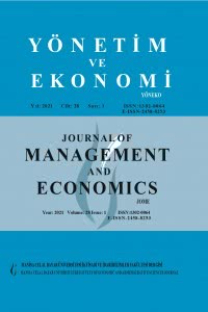Mülkiyet Problemi, Dışsallıklar ve Coasean Çözüm
İktisadi literatürde dışsallıklar kavramının analizi uzun süre Pigou’nun çalışması üzerine temellenmiştir. Pigou’ya göre özel ve sosyal üretim farklılaştığında hükümet bu duruma vergi koyarak, endüstrileri destekleyerek ya da düzenleme yaparak müdahale etmelidir. Pigou’dan sonraki analizler de bu görüşü büyük oranda paylaşmışlardır. Dışsallık kavramına farklı bir bakış açısı getiren Coase, özel maliyet ve sosyal maliyet sorununu geleneksel çözümünden farklı bir biçimde ele alarak yeniden iktisatçıların inceleme alanına sokmuştur. Coase’a göre yaratılan negatif dışsallıktan tek bir taraf sorumlu değildir; her iki tarafın da sorumluluğu söz konusudur. Bu durumda dışsallıklar karşılıklılık ilişkisi içerisinde ele alınmalıdır. Coase’un çalışmasından önce dışsallıkların piyasa yoluyla çözülebileceği, geleneksel yaklaşımdan dolayı uzun süre ihmal edilmiştir. Ancak Coase dışsallıklar sonucu ortaya çıkan bazı problemlerin piyasa yoluyla da etkin şekilde çözülebileceğini vurgulamıştır. Ayrıca Coase’un çalışmasıyla, pozitif işlem maliyetlerinin olduğu gerçek dünyada; yasa tarafından mülkiyet haklarının belirlenmesinin taşıdığı öneme de değinilmiştir. Coase’un dışsallıklar sorununa getirdiği farklı yorum ile birlikte, neo-klasik iktisat yeni bir açılım sağlamış ve piyasanın sorunu kendiliğinden çözümü tekrar önem kazanmaya başlamıştır. Bu çalışmada dışsallık kavramını geleneksel yaklaşımdan farklı olarak ele alan Coase’un yorumlayışı irdelenecek ve bu bağlamda Coase Teorisi tartışılacaktır.
Anahtar Kelimeler:
Coase Teorisi, dışsallıklar, mülkiyet hakları
Mülkiyet Problemi, Dışsallıklar ve Coasean Çözüm
In the literature, analysis of externalities have been grounded for a long time on Pigou's works. According to him, the state government should intervene in situations by levying taxes, supporting industries or by making arrangements when private and social production differ. Analysis after Pigou largely share this view. Coase brings a different perspective on the concept of externality. He put private cost and social cost of the solution differently from the traditional manner in to the investigation area of the economists. According to Coase both sides are responsible for the creation of negative externalities. In this case, externalities should be addressed in a relationship of reciprocity. Before Coase's work, the idea that externalities could be solved through the market has been neglected for a long time due to the belief in the traditional approach. However Coase’s study highlighted that problems of externalities can also be solved effectively by market. Also, Coase's work discussed the importance of the determination of property rights by law, where positive transaction costs in the real world occur. Concerning the problem of externalities, Coase's different interpretations, neo-classical economics provided a new opening and solution for the problem by the market itself has started to gain weight again. In this study Coase's interpretation which is dealing with the concept of externality with a different approach from the traditional one and Coase theory are examined and discussed in this context.
Keywords:
Coase Theory, externalities, property rights,
___
- ALEN, Douglas W. (1998), Property Rights, Transaction Costs, and Coase: One More time, Medema (eds), Coasean Economics: Law and Economics and the New Institutional Economics, New York, Kulwer Academic Publishers.
- ASLANBEIGUI, N ahid ve Steven G. MEDEMA (1998), Beyond the Dark Clouds: Pigou and Coase on S ocial Cost , History of Political Economy, 30(4): 601 -625.
- BUCHANAN, James M. ve Craig STUBBLEBINE (1962), Externality Economica, 29(116): 371 -384.
- CALABRESI, Guido (1968), Transaction Cost, Resource Allocation and Liability Rules - a Comment , Journal of Law and Economics, 11(1): 67 -73.
- CALABRESI, Guido ve Douglas A. MELAMED (1972), Property Rules, Liability Rules and Inalienability: One View of the Cathedral , Harvard Law Review, 85(6): 1089 -1128.
- COASE, Ronald H. (1959), The Federal Communications Commission , Journal of Law and Economics, 2: 1 -40.
- COASE, Ronald H. (1960), The Problem of Social Cost, Journal of Law and Economics , 3,1 -44.
- COASE, Ronald H. (1988), Notes on the Problem of Social Cost, The Firm the Market and the Law, Chicago, The University of Chicago Pres.
- COASE, Ronald H. (1992), The Institutional Structure of Production, The American Economic Reivew, 82(4): 713 -719.
- COLE, Daniel H . v e Peter Z. GROSSMAN (2005), Principles of Law and Economics , New York, Pearson Prentice Hall.
- DAHLAM, Carl J. (1979), The Problem of Externality , Journal of Law and Economics, 22(1): 141 -162.
- DALY, George ve Fred GIERTZ (1975), Externalities, Extortion, and Efficiency The American Economic Review, 65(5): 997 -1001.
- DEMSETZ, Harold (1972), When Does the Rule of Liability Matter? , Journal of Legal Studies , 1: 13 -28.
- FRIEDMAN , David (2000), Laws Order: An Economic Account, New Yo rk, Princeton University Press.
- MEDEMA , Steven G. (1994), Ronald H.Coase , London, The Macmillan Press.
- NUTTER, Warren G. (1968), The Coase Theorem on Social Cost: A Footnote , Journal of Law and Economics, 11(2): 503 -507.
- OĞUZ , Fuat (2003), Mülkiyet Hakları Bir Ekonomik Analiz, İstanbul, Roma Yayınları.
- PARISI, Francesco (1999), Coase Theorem and Transcation Cost Economics in Law, Backhaus (eds), The Elgar Companion to Law and Economics, Cheltenham, Edward Elgar Publishing.
- POLINSKY, Mitchell A. (1989), An Introduction to Law and Economics , Boston Little, Brown and Company.
- REGAN, Donald H. (1972), The Problem of Social Cost Revisited Journal of Law and Economics, 15(1): 427 -437.
- SAMUELS , Warren J. ve Steven G. MEDEMA (1998). Ronald Coase on Economic Policy Analysis: Framework and Implications, Medema (eds), Coasean Economics:Law and Economics and the New Institutional Economics, Boston, Kulwer Academic Publishers.
- STIGLER, George J. (1987), The Theory Of Price , New York, Collier Macmillian Publishers.
- WELLISZ, S tanislaw (1964), On External Diseconomies and the Government Assisted Invisible Hand , Economica , 31(124): 345-362.
- ZERBE, Richard O. (1980), The Problem of Social Cost in Retrospect Research in Law and Economics, 2: 83 -102.
- ISSN: 1302-0064
- Yayın Aralığı: Yılda 4 Sayı
- Yayıncı: Manisa Celal Bayar Üniversitesi İktisadi ve İdari Bilimler Fakültesi
Sayıdaki Diğer Makaleler
Nezih Metin ÖZMUTAF, Elif AKTEKİN
Mülkiyet Problemi, Dışsallıklar ve Coasean Çözüm
Yerel Yönetimler Açısından Dönüştürücü Liderlik: Belediye Çalışanlarına Yönelik Bir Araştırma
Antoni o Gramsc i'de Entelektüelin Bir Eleştirisi Olarak Praksis Düşüncesi
Reel Sektör Firmalarına Yönelik Kredi Derecelendirme Model Önerisi
